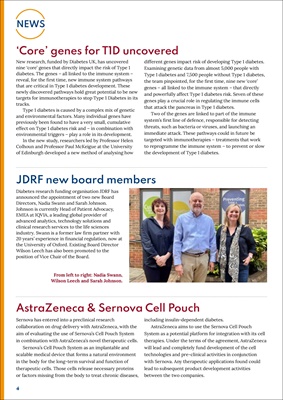
4
NEWS
'Core' genes for T1D uncovered
New research, funded by Diabetes UK, has uncovered
nine 'core' genes that directly impact the risk of Type 1
diabetes. The genes - all linked to the immune system -
reveal, for the first time, new immune system pathways
that are critical in Type 1 diabetes development. These
newly discovered pathways hold great potential to be new
targets for immunotherapies to stop Type 1 Diabetes in its
tracks.
Type 1 diabetes is caused by a complex mix of genetic
and environmental factors. Many individual genes have
previously been found to have a very small, cumulative
effect on Type 1 diabetes risk and - in combination with
environmental triggers - play a role in its development.
In the new study, researchers led by Professor Helen
Colhoun and Professor Paul McKeigue at the University
of Edinburgh developed a new method of analysing how
different genes impact risk of developing Type 1 diabetes.
Examining genetic data from almost 5,000 people with
Type 1 diabetes and 7,500 people without Type 1 diabetes,
the team pinpointed, for the first time, nine new 'core'
genes - all linked to the immune system - that directly
and powerfully affect Type 1 diabetes risk. Seven of these
genes play a crucial role in regulating the immune cells
that attack the pancreas in Type 1 diabetes.
Two of the genes are linked to part of the immune
system's first line of defence, responsible for detecting
threats, such as bacteria or viruses, and launching an
immediate attack. These pathways could in future be
targeted with immunotherapies - treatments that work
to reprogramme the immune system - to prevent or slow
the development of Type 1 diabetes.
JDRF new board members
AstraZeneca & Sernova Cell Pouch
Sernova has entered into a preclinical research
collaboration on drug delivery with AstraZeneca, with the
aim of evaluating the use of Sernova's Cell Pouch System
in combination with AstraZeneca's novel therapeutic cells.
Sernova's Cell Pouch System as an implantable and
scalable medical device that forms a natural environment
in the body for the long-term survival and function of
therapeutic cells. Those cells release necessary proteins
or factors missing from the body to treat chronic diseases,
including insulin-dependent diabetes.
AstraZeneca aims to use the Sernova Cell Pouch
System as a potential platform for integration with its cell
therapies. Under the terms of the agreement, AstraZeneca
will lead and completely fund development of the cell
technologies and pre-clinical activities in conjunction
with Sernova. Any therapeutic applications found could
lead to subsequent product development activities
between the two companies.
To read more, CLICK HERE.
From left to right: Nadia Swann,
Wilson Leech and Sarah Johnson.
Diabetes research funding organisation JDRF has
announced the appointment of two new Board
Directors, Nadia Swann and Sarah Johnson.
Johnson is currently Head of Patient Advocacy,
EMEA at IQVIA, a leading global provider of
advanced analytics, technology solutions and
clinical research services to the life sciences
industry. Swann is a former law firm partner with
20 years' experience in financial regulation, now at
the University of Oxford. Existing Board Director
Wilson Leech has also been promoted to the
position of Vice Chair of the Board.